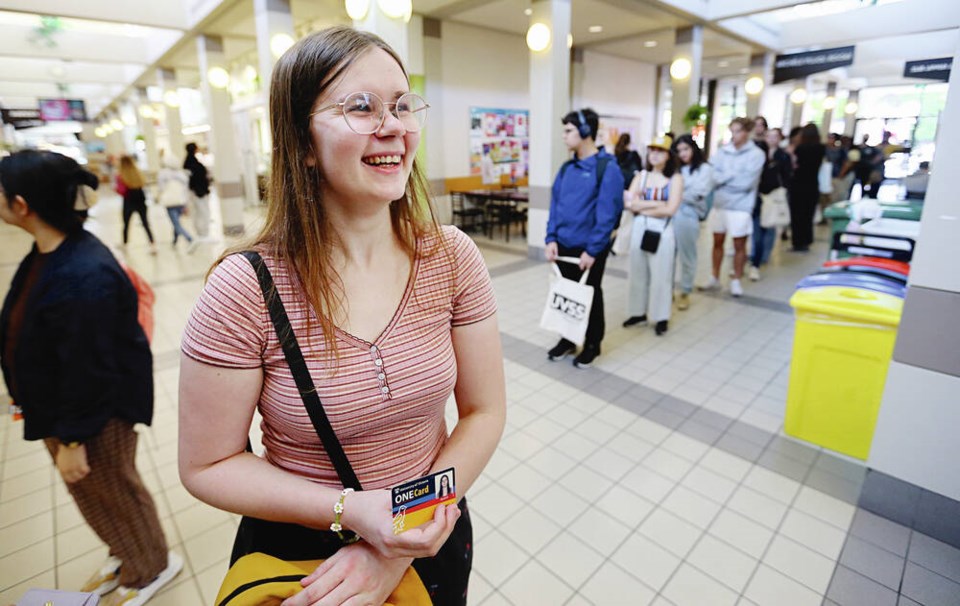There was a long line at the University of Victoria’s Student Union building as students queued up for their Umo transit card on Tuesday, the first day of school.
The rollout of Umo, an electronic bus-fare system in Greater Victoria, means that most post-secondary students no longer have the option of swiping their student identification to use their bus passes. They’ll have to use the Umo phone app or a Umo card.
While Camosun College students still have the option of using their Camosun identification cards to access their bus passes until January 2024, UVic and Royal Roads University students have to switch to the new system.
Lane O’Hara Cooke, director of outreach and university relations with UVic’s undergraduate student union, said that a lot of students are choosing to put their bus pass on the Umo card over the app. “I think there was maybe a generational disconnect about what was wanted.” There’s just something more reassuring about a card than a phone app, she said.
Cooke, who is from Hamilton, Ont., said that the idea of a card loaded with a pass or cash is “standard” in the Greater Toronto Area, which uses the Presto card system.
But Cooke said that the Umo rollout has generated a fair amount of complaints from students. “A loading card is something that was inevitable and necessary,” she said. “But I do understand that students feel inconvenienced and guinea pig-ified right now.”
Cleo Philp, director of campaigns and community relations with the undergraduate student union, points to the online backlash that UVic has received as an example of students who didn’t like the change.
“A change literally no one asked for; can’t wait to spend 30 minutes loading the bus with everyone scanning their QR code,” she said, reading from the comment section of a UVic social media post announcing the changes to the bus pass. “People are a little upset about not having functionality on the ONECard [student ID] anymore.
Philp said that she’s already experienced one incident of her pass not working as intended when her phone refused to work properly at the scanner.
Students lining up to receive their new Umo transit cards at the Student Union Building gave mixed reviews about the app.
Sam Penner, a second year writing student who has used the Umo app twice and has decided to opt for the card instead, said it’s hard to line up a phone with the scanning machine on a bus. “The QR is also a pain to look at because of how much it moves.”
Mfwanwy Warren, a fourth-year software engineering student, said she now has three school-related cards to deal with, as she also has to keep track of her engineering building access card.
A recent post by UVic student social media meme account @uvicaffirmations show the plethora of cards that are being issued on campus in addition to ONECard: a UVic GUESTCard, a B.C. Transit Umo card, a resident housing laundry card, a reusable food-container card that serves as student identification.
Kyla Turner, executive director of UVic’s graduate student union, said it’s too early in the semester to know how many people are opting to use the card over the app.
The graduate student union has received concerns about the Umo app, mainly concerning having a bus pass tied to the longevity of a phone’s battery life; the linking of daily transit habits to a device with personal information on it; and the need for a separate app rather than having the transit pass integrated into Google Pay or Apple Wallet, she said in a statement.
International students with phones purchased outside of Canada cannot install the Umo app, as the app is not available for download in every region.
Turner said that the student unions at UVic will be passing along feedback to B.C. Transit and will be happy to assist any students who are struggling with the new bus pass system.
In a statement, B.C. Transit spokesperson said that a “very high” number of students have already redeemed their school-provided Umo benefit code for student pricing.
The transit agency said overall, there is a higher rate of app adoption compared to reloadable cards.
Numbers on the uptake of the app compared with the reloadable card were not immediately available.
>>> To comment on this article, write a letter to the editor: [email protected]



